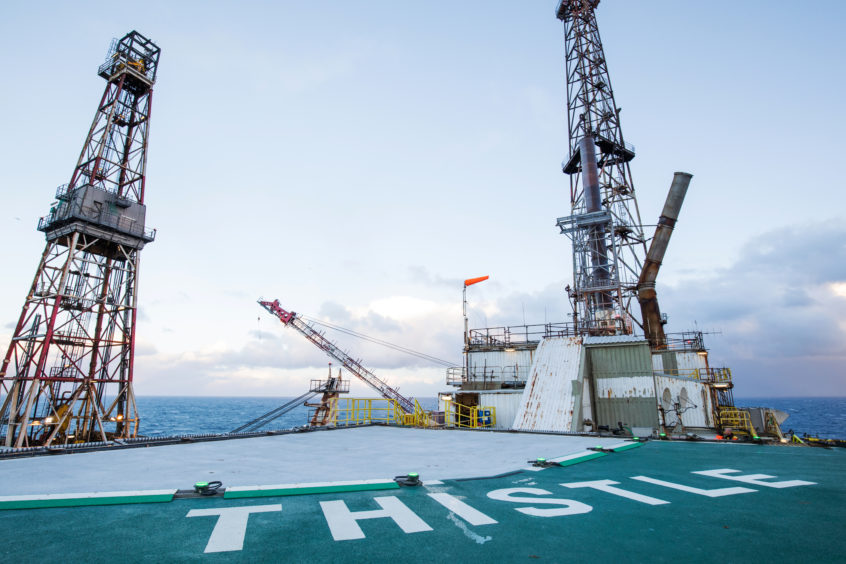
The chairman of the Health and safety Executive (HSE) has warned the North Sea needs to be “constantly vigilant” after a platform was evacuated over structural concerns.
Martin Temple addressed delegates at the opening session of the Oil and Gas UK (OGUK) HSE Conference in Aberdeen on Wednesday, referencing the down-manning of EnQuest’s Thistle Alpha installation last month.
The platform, around 125miles north-east of Shetland, evacuated its 115 crew after a subsea inspection flagged deterioration in the condition of a metal plate connecting a storage tank to the platform’s legs.
Mr Temple said that recent case, among others, highlighted the need for the sector to focus on asset integrity.
He said: “Asset integrity includes the primary structure of the installation, the integrity of which all else on the installation depends. 2017 saw the shutdown and removal of a floating production unit (FPU), which was of the same design as the Alexander L Kielland.
“In 1980, the Alexander L Kielland sustained a structural failure and capsized within 20 minutes. 123 men died. It was Norway’s equivalent of the Piper Alpha.
“The recent down manning of the Thistle Alpha platform following subsea inspection findings, which have implications for the integrity of the primary structure, reminds us to be constantly vigilant for changes in these high consequence risks and for effective safety management systems to deal with them.”
Earlier this week, EnQuest said it was working on a number of options to restore the platform to production.
Mr Temple’s speech at the P&J Live event came after industry leaders from various offshore bodies signed up to a set of Process Safety Leadership principles on Tuesday evening, promoting the involvement of senior managers in preventing “major hazards”.
It comes after OGUK’s HSE report last month showed the number of major hydrocarbon releases increased to four last year, having recently being plateaued at two to three.
The number of reportable incidents in the UK also increased.
Mr Temple said the principles are designed to prevent any repeats of Piper Alpha or the 2005 Buncefield explosion at the Hertfordshire Oil Storage Terminal.
The economic cost of a repeat of Buncefield, where there were no fatalities, would be around £1bn, however another Piper Alpha, which cost the lives of 167 men, would be considerably higher, he warned.
Mr Temple said: “Should such a dreadful event ever happen again on the same scale, the audience would be larger; the questioning more critical and sustained; and the answers demanded more punishing. Social and political support for the industry could plummet and its social licence to operate severely threatened.
“Regulators and the regulated should continually remind themselves of this social warrant and continue to work hard, together, with renewed imagination, invention and vigour to further reduce and, where possible, eliminate the historic risks and meet the challenges of future risks, in our constantly evolving world of work.”
Mr Temple also used the speech to highlight that the industry should be looking more closely at the underlying causes of hydrocarbon releases, such as ensuring proper maintenance and identifying corrosion, as well as improving management of change.
He added: “Hydrocarbon release figures are a poor indicator of performance. Just one major release could lead to a catastrophe and therefore leaders need to look deeper into their fundamental causes and the barriers that prevent them.
“They must be able to demonstrate that the key safety barriers relating to people, processes and plant are intact, are robust to error and are working effectively.”

